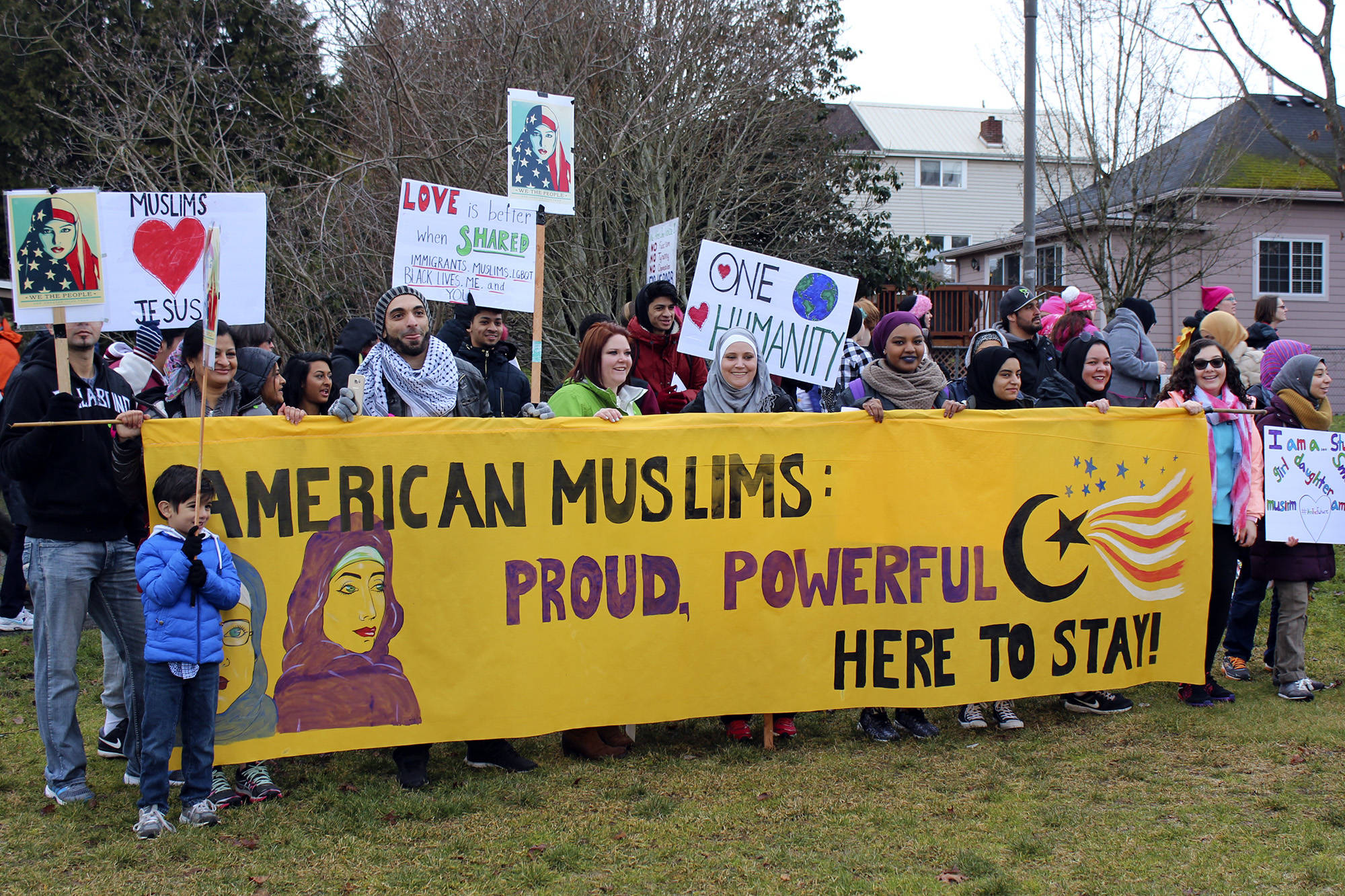On Thursday, Muslim Ban 3.0 went into effect—the so-called “watered-down” version of the Trump administration’s ban on travelers from six Muslim-majority countries. The ban now temporarily blocks travelers from these countries who don’t have a “bona fide” relationship with someone in the United States, as well as barring refugees from anywhere in the world. The Supreme Court will hear oral arguments on the case this fall.
Many critics, including lawyers with the ACLU and the Council on American-Islamic Relations (CAIR), believe that the newest version is still blatantly illegal and unjust—and the state of Hawaii is already challenging it in court. Washington Attorney General Bob Ferguson said in a statement prior to the ban’s implementation that although the latest version does leave some “important protections” in place, he is “deeply disappointed … that the travel ban will go partly into effect,” and promises to keep fighting.
For Arsalan Bukhari, executive director of CAIR-WA, regardless of whether or not this partly revived ban affects as many people directly, the politcal and media commentary it foments is still exhausting and infuriating. “The language in [the ban] doesn’t matter as much as just the constant attacks on American Muslims that these conversations generate,” he says. “The rhetoric and the hate crimes and the discrimination and the taunts at the workplace and at schools that it all inspires … that’s what people are really feeling.”
In some ways, he says, this is the result of the startling dearth of American Muslims in media and political professions—the people who shape the messaging, the narratives, the conversations, and who have decision-making power. Each time a new “Muslim ban” makes its way through the airwaves, it’s a new “reminder that we should do something about this,” he says. “Our message has constantly been that waiting on the sidelines isn’t really effective. Politics is not a spectator sport. You have to get in the field and play.”
To that end, CAIR-WA just announced a new, refreshed version of the group’s ongoing efforts to encourage local Muslim youth and adults to explore careers in media, politics, and public-interest law. Bukhari points out that, at least according to the anecdotal numbers his office has found in recent years, there are only a couple of American Muslims working full-time in mainstream media outlets in Washington state, and “less than 10 who work for political office.” Although “very highly represented in IT and medicine,” he says, Muslims “are very underrepresented—in fact, almost unrepresented—in media and politics and public-service law,” sectors that have a huge impact on both legislation and public opinion.
CAIR-WA wants to change that. Called “Our Time to Shine,” the program encourages local Muslims, both kids and adults, to apply to participate in a July 15 event in downtown Seattle that will gather together role models in media and politics as well as representatives from a slew of local political campaigns. The event will not only serve as a kind of career fair, Bukhari says, but also as a way for people to take immediate action: Participants are expected to sign up that day with a 2017 political campaign for which they would like to volunteer. Both Republican and Democratic candidates will be there, Bukhari says, as well as multiple candidates for local races.
And for those “Our Time to Shine” participants who volunteer 100 hours between now and November, CAIR-WA will also connect them with opportunities to apply for up to $100,000 in scholarships to help pay for the continuing education necessary to get a foothold in these fields.
Hamdi Mohamed, the constituent services and outreach coordinator for U.S. Rep. Pramila Jayapal, will be among the professional mentors present on July 15. She says her career started during her junior year of college at the University of Washington with an internship at OneAmerica, and she has stayed involved in social justice-oriented politics ever since. “As a black Muslim woman, I felt this obligation … to help my proud Muslim American community feel safe and respected, to make them feel like they had a place at the decision-making table,” she says—not something they often feel. And she definitely wants more Muslim faces and voices in media and in politics. “There aren’t a lot of people out there today that look like me, that are doing that type of work. We’re a minority in this space.”
Especially amid a barrage of anti-Muslim rhetoric and hate crimes, initiatives like CAIR-WA’s are a way to be proactive, rather than defensive, she says. “Representation is huge. It matters.” And it’s crucial to show Muslim youth “that they have a place in politics, they have a place in the media. They can pursue those dreams. … [But] in order to do that, somebody has to spark that life in you.”
Bukhari says that CAIR-WA hopes to get at least 200 people signed up for this year’s program, and offered one sneak preview for next year: They want to help local Muslims run for political office, too.
“You saw the rhetoric during the 2016 elections,” he says, “from both parties, to be fair, from both parties. Imagine if we could get 100 or so Muslim youth into media or politics as an intern or a volunteer. Imagine how different politicians and candidates and news coverage and commentary would look in the 2020 elections with 100 more community members as part of the process. … You have to have people in those positions.”
Plus, as Bukhari sees it, these would be people who are “not just there to have a job.” Rather, they’d be “working that job because they want to make a difference.”
sbernard@seattleweekly.com








